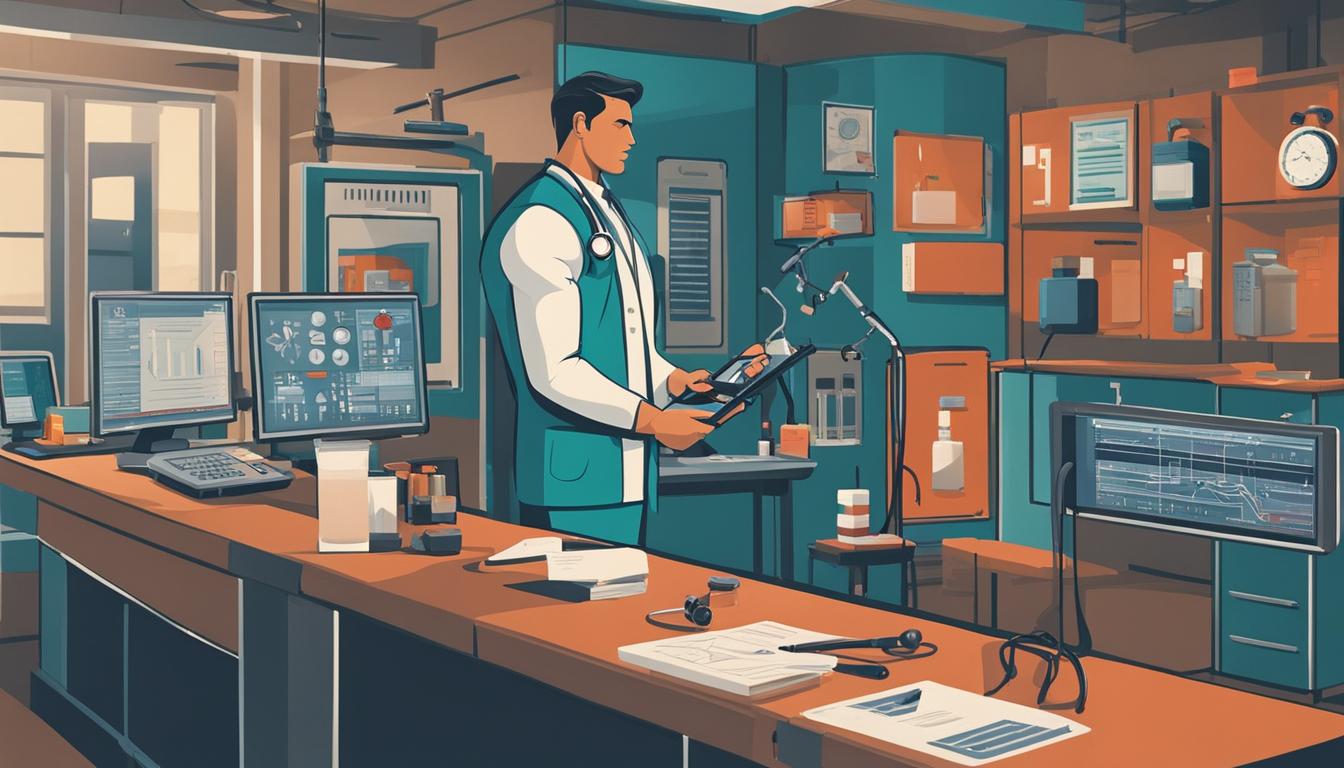Men’s health is a topic that requires attention and proactive measures to ensure a healthy future. Unfortunately, men tend to engage in behaviors that can negatively impact their health, such as smoking, excessive alcohol consumption, and risky choices. To address these concerns, it is crucial for men to prioritize their physical and mental well-being. This article will explore common men’s health issues and provide preventative tips to help men lead long and healthy lives.
Key Takeaways:
- Men’s health requires proactive measures and attention.
- Behavioral choices like smoking and excessive alcohol consumption can harm men’s health.
- Physical and mental well-being should be prioritized.
- This article will cover common men’s health issues and preventive tips.
- By implementing preventive measures, men can lead healthier lives.
Importance of Diet and Exercise for Men’s Health
Maintaining a balanced diet and engaging in regular exercise are essential for optimal men’s health. Consuming a variety of nutrient-rich foods, including vegetables, fruits, lean protein, and high-fiber foods, can provide the necessary nutrients for overall well-being. Men should aim for at least 150 minutes of moderate activity per week and incorporate strength training exercises to reduce the risk of falls and injuries.
Regular exercise can also aid in weight management and lower the risk of various health conditions, including heart disease, stroke, and diabetes. By staying physically active, men can improve their cardiovascular health, strengthen their bones and muscles, and enhance their mental well-being. Exercise has also been linked to improved sleep quality and reduced stress levels.
When it comes to diet, men should focus on maintaining an appropriate calorie intake to support their energy needs. Consuming a variety of whole grains, lean proteins, and healthy fats can provide the necessary nutrients for optimal health. It is important to limit the intake of processed and high-sugar foods, as they can contribute to weight gain and increase the risk of chronic diseases.
Eating Tips for Men’s Health:
- Aim for a balanced plate with a mix of fruits, vegetables, whole grains, lean proteins, and healthy fats.
- Limit the intake of saturated and trans fats, as they can increase the risk of heart disease.
- Stay hydrated by drinking an adequate amount of water throughout the day.
- Avoid excessive alcohol consumption, as it can have negative effects on health.
- Limit the intake of processed and high-sugar foods, opting for whole foods instead.
Exercise Tips for Men’s Health:
- Engage in at least 150 minutes of moderate-intensity aerobic activity per week, such as brisk walking, cycling, or swimming.
- Incorporate strength training exercises at least twice a week to build and maintain muscle mass.
- Find activities that you enjoy to stay motivated and make exercise a regular part of your routine.
- Make physical activity a priority, even if you have a busy schedule. Look for opportunities to move throughout the day.
Healthy Lifestyle Choices for Men
When it comes to men’s health, making healthy lifestyle choices plays a crucial role in overall well-being. By prioritizing physical and mental health, men can improve their quality of life and reduce the risk of various health conditions. Here are some important tips for maintaining a healthy lifestyle:
- Maintain a healthy weight: Being overweight or obese increases the risk of heart disease, diabetes, and other health problems. Adopting a balanced diet and engaging in regular exercise can help achieve and maintain a healthy weight.
- Avoid smoking and tobacco use: Smoking is a leading cause of preventable diseases, including lung cancer, heart disease, and respiratory conditions. Quitting smoking and avoiding tobacco products can significantly improve overall health.
- Limit alcohol consumption: Excessive alcohol intake can lead to liver damage, addiction, and increased risk of accidents. It is recommended to consume alcohol in moderation or avoid it altogether.
- Protect your skin from the sun: Overexposure to the sun’s harmful UV rays can increase the risk of skin cancer. Use sunscreen, wear protective clothing, and seek shade during peak sun hours.
- Manage stress levels: Chronic stress can have detrimental effects on both physical and mental health. Engage in stress-reducing activities such as exercise, meditation, and spending time with loved ones.
- Practice safe sex: Using barrier methods, such as condoms, can reduce the risk of sexually transmitted infections. Regular screenings for STIs are also important for early detection and treatment.
- Avoid risky behaviors: Engaging in activities such as excessive gambling or drug use can have severe consequences for mental and financial well-being. Make responsible choices to maintain a healthy lifestyle.
By incorporating these healthy lifestyle choices into daily routines, men can take proactive steps towards improving their overall health. Remember, small changes can make a big difference in the long run.
Quote:
“The choices we make today determine our health tomorrow.”
It’s important for men to prioritize their health and well-being. By making informed decisions and adopting healthy habits, men can set themselves up for a lifetime of good health.
Preventive Healthcare and Screening for Men
Maintaining good health and preventing potential health issues is essential for every man. Regular preventive healthcare and screenings play a vital role in achieving this goal. By proactively monitoring your health, you can detect any problems early on and take necessary steps to address them. Here are some key preventive healthcare measures and screenings that every man should consider:
1. Annual Check-ups:
Visiting your primary care doctor for an annual check-up is crucial for monitoring your overall health. During these visits, your doctor will evaluate your vital signs, conduct physical examinations, and assess your risk factors for various conditions.
2. Vaccinations:
Staying up to date on vaccinations is important for disease prevention. Some common vaccinations for men include the flu shot, tetanus booster, pneumonia vaccine, and hepatitis A and B vaccines.
3. Blood Pressure Check:
High blood pressure is a significant risk factor for heart disease and stroke. Regular blood pressure checks can help identify any abnormalities and allow for early intervention.
4. Cholesterol Level Tests:
Monitoring your cholesterol levels is essential for maintaining heart health. High cholesterol levels can increase the risk of heart disease. Regular cholesterol level tests can help identify any issues and guide appropriate interventions.
5. Colon Cancer Screening:
Starting at the age of 50, men should consider getting screened for colon cancer. This may involve a colonoscopy or other types of tests, depending on your doctor’s recommendation. Early detection of colon cancer can significantly improve the chances of successful treatment.
By prioritizing preventive healthcare and undergoing regular screenings, men can take proactive steps towards maintaining good health and preventing the development of serious health conditions. Remember, early detection is key, so don’t wait until you have symptoms to seek medical attention.

Mental Health and Men
Men’s mental health is an integral aspect of overall well-being. It is important for men to prioritize their mental health and seek support when needed. Mental health conditions, such as anxiety and depression, can have a significant impact on a man’s quality of life, relationships, and overall functioning. It is essential to address these concerns and raise awareness about the importance of mental health within the male population.
Managing stress levels is crucial for maintaining good mental health. Taking time to engage in stress-reducing activities, such as exercise, meditation, or hobbies, can help men cope with everyday pressures and improve their overall well-being. Additionally, building a strong support system of friends, family, or professionals can provide a valuable outlet to express emotions and seek guidance during difficult times.
In case of severe mental health issues or suicidal thoughts, it is crucial for men to reach out for help. Helplines, such as the Suicide and Crisis Lifeline at 988, are available 24/7 to provide immediate support and assistance. Seeking professional help from therapists or counselors can also be beneficial in managing mental health conditions and developing effective coping strategies. Remember, seeking help is a sign of strength, and there is no shame in reaching out for support.

Prioritizing Men’s Mental Health: Tips for Well-being
- Manage stress through healthy coping mechanisms, such as exercise, meditation, or practicing mindfulness.
- Build a strong support system of friends, family, or professionals who can provide guidance and emotional support.
- Seek help from a mental health professional if experiencing severe mental health concerns or suicidal thoughts.
“Seeking help is a sign of strength, and there is no shame in reaching out for support.” – Anonymous
By recognizing the significance of men’s mental health and taking proactive measures to prioritize it, men can ensure their overall well-being and lead fulfilling lives.
Factors Affecting Men’s Health
Men’s health is influenced by various factors, encompassing biological, socioeconomic, and cultural aspects. These factors play a significant role in shaping men’s health outcomes and should be considered in healthcare policies and programs. Understanding the impact of these factors is crucial for improving men’s health on a broader scale.
Biological factors, including genetics and hormonal differences, contribute to varying health outcomes among men. These factors can influence susceptibility to certain diseases and conditions, as well as the effectiveness of treatments and interventions. Socioeconomic status, another key factor, plays a vital role in men’s health. Men from lower socioeconomic backgrounds may face barriers to accessing healthcare services, leading to delayed treatment and poorer health outcomes.
Cultural norms and societal expectations surrounding masculinity also significantly affect men’s health. Traditional ideas of masculinity may discourage men from seeking help for mental health issues or discussing their health concerns openly. These norms can hinder preventive care and early intervention, impacting men’s overall well-being.
To address these factors and improve men’s health outcomes, it is crucial to promote a holistic approach to healthcare. This approach involves considering the biological, socioeconomic, and cultural factors that influence men’s health and tailoring healthcare interventions accordingly. By addressing these factors, healthcare providers can work towards reducing health disparities and improving the overall well-being of men.

Key Takeaways:
- Biological factors, such as genetics and hormonal differences, can contribute to varying health outcomes among men.
- Socioeconomic status plays a significant role in men’s health, with lower socioeconomic backgrounds leading to barriers in accessing healthcare services.
- Cultural norms and societal expectations surrounding masculinity can impact men’s health-seeking behaviors and preventive care.
- A holistic approach to healthcare, considering biological, socioeconomic, and cultural factors, can help improve men’s health outcomes.
Specific Health Conditions for Men
When it comes to men’s health, there are several specific conditions that men should be aware of. These conditions can have a significant impact on quality of life and overall well-being. It is important for men to understand the signs and symptoms of these conditions and seek appropriate medical care. Here are a few key health issues that commonly affect men:
1. Prostate Cancer
Prostate cancer is one of the most common types of cancer among men. It typically develops in the prostate gland, which is responsible for producing semen. Regular screenings and early detection are crucial for successful treatment. Men should discuss with their healthcare provider when to begin prostate cancer screenings and how often they should be performed.
2. Low Testosterone
Low testosterone, also known as hypogonadism, occurs when the body doesn’t produce enough testosterone. This condition can cause a range of symptoms, including fatigue, erectile dysfunction, decreased libido, and mood changes. If you are experiencing any of these symptoms, it is important to consult with a healthcare provider who can diagnose and treat low testosterone.
3. Erectile Dysfunction
Erectile dysfunction (ED) is a common condition that affects men of all ages. It is characterized by the inability to achieve or maintain an erection sufficient for sexual intercourse. While ED can have physical causes, such as diabetes or cardiovascular disease, it can also be influenced by psychological factors. Treatment options for ED include medication, therapy, and lifestyle changes.
4. Testicular Cancer
Testicular cancer is a relatively rare form of cancer that affects the testicles. It is most common in young men between the ages of 15 and 35. Regular self-examinations and early detection are key for successful treatment. Men should be aware of any changes in the size, shape, or consistency of their testicles and seek medical attention if they notice anything unusual.
By being aware of these specific health conditions and seeking timely medical care, men can take proactive steps towards maintaining their health and well-being.

Men’s Health on a Global Scale
Men’s health issues are not confined to a specific region or country; they are a global concern. Men worldwide face health disparities that result in lower life expectancy compared to women. These disparities can be attributed to various factors, including socioeconomic status, lifestyle choices, and access to healthcare. It is crucial to recognize and address men’s health as a global public issue in order to improve health outcomes and reduce these disparities on a global scale.
In many countries, men’s health concerns often go unnoticed or are not given adequate attention. This lack of focus on men’s health can have significant consequences, as it leads to missed opportunities for prevention, early detection, and treatment of various health conditions. By raising awareness about men’s health issues, we can ensure that men receive the necessary support, resources, and information to make informed decisions and take proactive steps to protect their health.
Addressing the Challenges
Addressing men’s health issues on a global scale requires a multifaceted approach. Governments, healthcare providers, and international organizations need to collaborate to develop policies and programs that specifically target men’s health concerns. This includes providing access to affordable healthcare services, promoting preventive measures, and implementing public health campaigns that educate and empower men to prioritize their health.
“Improving men’s health on a global scale requires a collective effort from individuals, communities, and governments. By recognizing the unique challenges that men face and implementing targeted strategies, we can bridge the gap in men’s health outcomes and create a healthier future for all.”
Additionally, research and data collection efforts should focus on understanding the specific health issues that affect men in different regions and populations. This information can help identify trends, risk factors, and effective interventions that can be tailored to the needs of men in different cultural contexts. By sharing knowledge and best practices across borders, we can accelerate progress in men’s health and work towards achieving equitable health outcomes for all.
- Recognize men’s health as a global public issue
- Raise awareness about men’s health disparities
- Develop policies and programs targeting men’s health concerns
- Promote access to affordable healthcare services
- Implement public health campaigns to educate and empower men
- Collect data and conduct research to understand regional and cultural-specific health issues in men
- Share knowledge and best practices to accelerate progress in men’s health
Conclusion
Men’s health is a critical issue that deserves our attention and proactive efforts. By prioritizing their physical and mental well-being, men can take important steps towards a healthier future. It is crucial to adopt healthy lifestyle choices, seek preventive healthcare, and avail themselves of available resources.
Adopting a balanced diet and engaging in regular exercise can significantly improve men’s health. Incorporating nutrient-rich foods and staying physically active can reduce the risk of various health conditions, including heart disease and diabetes. Additionally, making healthy lifestyle choices, such as maintaining a healthy weight, avoiding smoking and excessive alcohol consumption, and managing stress levels, is key to overall well-being.
Regular preventive healthcare and screenings are essential for maintaining men’s health. By scheduling routine checkups, receiving vaccinations, and undergoing recommended screenings, men can detect potential health issues early and prevent diseases. It is important to prioritize mental health as well, seeking help when needed and utilizing available resources to promote overall well-being.
As we address men’s health concerns on a global scale, it is essential to recognize and reduce health disparities. By implementing healthcare policies and programs that specifically target men’s health issues, we can improve health outcomes and ensure better access to resources for men. Together, we can bridge the gap in men’s health and provide a healthier future for all.
FAQ
What are some common men’s health issues?
Common men’s health issues include heart disease, prostate cancer, erectile dysfunction, and mental health concerns such as depression and anxiety.
How can I improve my diet for better men’s health?
To improve your diet for better men’s health, focus on consuming a variety of nutrient-rich foods, including vegetables, fruits, lean protein, and high-fiber foods.
How much exercise should men aim for?
Men should aim for at least 150 minutes of moderate activity per week, along with strength training exercises to reduce the risk of falls and injuries.
What lifestyle choices are important for men’s health?
Important lifestyle choices for men’s health include maintaining a healthy weight, avoiding smoking and tobacco use, limiting alcohol consumption, protecting the skin from the sun, managing stress levels, practicing safe sex, and avoiding risky behaviors.
How often should men visit their primary care doctor?
Men should visit their primary care doctor at least once a year for routine checkups, rather than only seeking medical care when they are ill.
What screenings are recommended for men’s health?
Recommended screenings for men’s health include dental and eye exams every 6 to 12 months, blood pressure checks every 1 to 2 years, cholesterol level tests, colon cancer screenings starting at age 50 (or earlier if there is a family history), and prostate cancer screenings starting at age 55.
How can men prioritize their mental health?
Men can prioritize their mental health by managing stress levels, seeking help for anxiety, depression, or other mental health conditions, and maintaining a support system. Therapy, medication, and helplines can also provide assistance.
What factors can affect men’s health?
Factors that can affect men’s health include genetics, hormonal differences, socioeconomic status, occupational hazards, lifestyle choices, and cultural norms surrounding masculinity.
What specific health conditions should men be aware of?
Men should be aware of specific health conditions such as prostate cancer, low testosterone, erectile dysfunction, premature ejaculation, and testicular cancer.
Are men’s health concerns present globally?
Yes, men’s health concerns are present globally, with men facing health disparities and lower life expectancy compared to women. These disparities can be attributed to various factors, including socioeconomic status, lifestyle choices, and access to healthcare.


